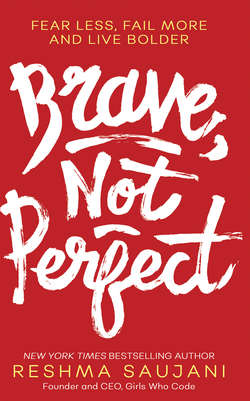Читать книгу Brave, Not Perfect - Reshma Saujani - Страница 16
The Fixed Mindset
ОглавлениеWhen Amanda declared that she didn’t dare try lacrosse, she fell victim to a type of thinking that Stanford psychologist Carol Dweck famously outlined in her brilliant book Mindset. In a nutshell, Dweck identified two different belief systems about ability and intelligence.
The first is a fixed mindset. A person with a fixed mind-set believes that their abilities are innate and unchangeable. You’re either smart or you aren’t, talented or untalented, athletic or not at all, and there’s not much you can do about it. The other is a growth mindset, which is based on the belief that abilities can be developed and cultivated through effort. Regardless of whatever natural level of ability or talent you are born with, you can learn skills and improve.
These are the hallmarks of a fixed mindset:
• An urgency to prove oneself again and again.
• Deep concern about making mistakes and failing.
• A reluctance to expose deficiencies.
• Seeing imperfections as shameful.
• The expectation that one will do well on something right away and if one doesn’t, the loss of interest or self-admonishment for having put in the effort.
• The tendency to see failures as a measure of one’s worth and allowing those failures to define the person.
• Being solely focused on the outcomes. It doesn’t matter what one achieved or learned along the way. Not hitting the final mark means failure. And failure means that one isn’t smart, talented, or good enough.
Sound familiar?
When you tell someone with a fixed mindset that they are smart or talented, they etch these messages into the “this is how I am” truth in their minds. That sounds like good, positive self-esteem building, but the problem is that after being showered with such praise of their perceived innate abilities, they fall to pieces when they encounter setbacks. Why? Because they take any failure, however insignificant, as a sign that maybe they aren’t as innately smart or talented as they thought.
A fixed mindset also holds us back from trying anything outside our comfort zone. How many times have you begged off doing something spontaneous and potentially fun with, “I’m just not adventurous,” or turned down an invitation or opportunity because “that’s just not who I am”? That’s the fixed mindset at work.
Not surprisingly, girls are more prone to a fixed mindset than boys. This is partially because, as Dr. Dweck’s research showed, parents and teachers tend to give boys more “process praise,” meaning they reward them for putting in effort, trying different strategies, sticking with it, and improving, rather than for the outcome. In the absence of this kind of process praise, girls come to believe that if they can’t get something right away, they’re dumb. You can see how this impacts us later in life, as we take even the smallest daily mistakes as indicators of fundamental limitations. We forget to pick up the school supplies our kid asked for = we’re bad moms. We get a ticket for a broken taillight that we’d been meaning to take care of = we’re idiots. We see a failure as a definitive condemnation of our worth, rather than seeing ourselves and our abilities as works in progress.
The single best example I can point to of girls being trapped in a fixed mindset is in relation to STEM subjects (science, technology, engineering, math). As you might imagine, being the founder of an organization that teaches coding to girls, I hear the refrain “I’m just not good at math” a lot. Like Destiny, who cringed when the boys made fun of her for taking so long up at the board to solve a math problem, or like the girls who delete their work in coding classes, it isn’t a lack of interest or capacity in these subjects that scares them off, but a perception that they’re fundamentally bad at it. After being told outright—or subtly, through the micromessages we’ll talk about in the next chapter—that boys are naturally better at math and computing (they aren’t) and that girls are innately more suited for humanities (again, not true), they believe to their core that their abilities in these subjects—or lack thereof—are carved in stone.
Of course, they aren’t. Carol Dweck points out that no one is born with a fixed mindset; in fact, we all come prewired with a desire to learn and grow. It’s only once children begin to evaluate themselves (I’m smart/not smart) that they become afraid of challenges. Thankfully, as adults, we can undo that long-ago wiring by taking on the practice of bravery in the here and now.
